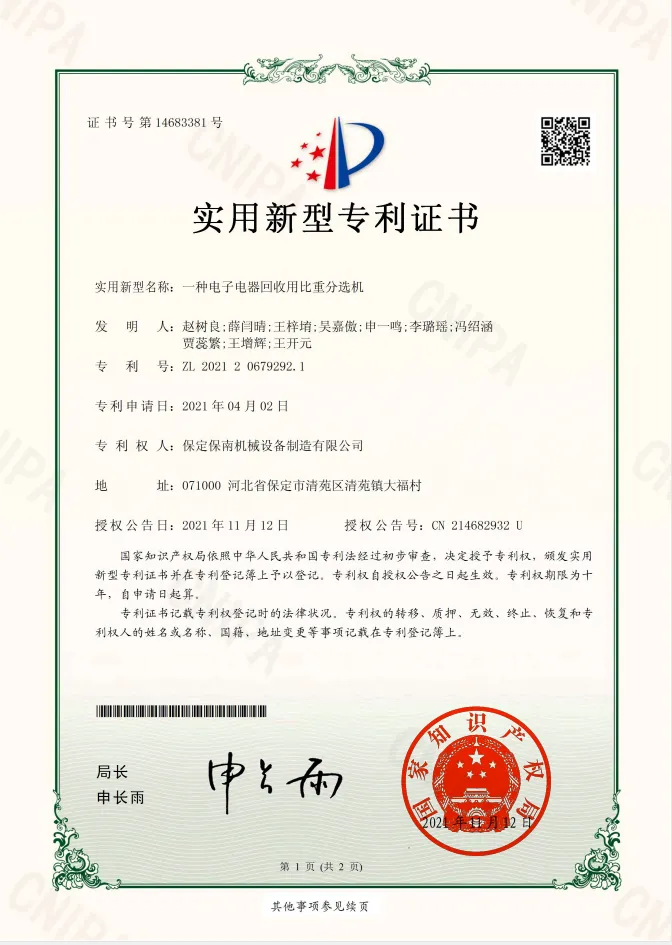
9 月 . 30, 2024 00:54 Back to list
The Importance of Aluminum Recycling Plants
Aluminum recycling has become an essential process in today's world, driven by the need for sustainable practices and the conservation of our planet's resources. Aluminum is one of the most widely used metals globally, thanks to its lightweight, strength, and resistance to corrosion. Aluminum recycling plants play a crucial role in ensuring that this valuable metal is reused, significantly reducing waste and energy consumption.
The Recycling Process
The aluminum recycling process begins with the collection and sorting of aluminum waste. This waste primarily comes from products such as cans, automotive parts, construction materials, and various consumer goods. Once collected, the aluminum is taken to a recycling plant where it undergoes several processes.
Firstly, the aluminum is thoroughly cleaned to remove any contaminants, such as food residues or paints, which could affect the quality of the recycled metal. After cleaning, the aluminum is shredded into small pieces, which helps in easier melting and further processing. Next, the shredded aluminum is melted in large furnaces. Remarkably, recycling aluminum uses only about 5% of the energy required to produce new aluminum from raw materials. This significant energy savings highlights the importance of aluminum recycling plants in reducing overall energy consumption and greenhouse gas emissions.
Once melted, the aluminum can be cast into ingots or sheets, ready to be used in various manufacturing processes. This recycled aluminum can be used to create new cans, packaging, car parts, building materials, and much more. In fact, about 75% of the aluminum ever produced is still in use today, thanks in large part to recycling efforts.
Environmental Impact and Benefits
The environmental benefits of aluminum recycling are profound. By reprocessing aluminum, we mitigate the need for bauxite mining, which is not only energy-intensive but also has detrimental effects on ecosystems. Mining operations can lead to deforestation, soil erosion, and habitat destruction. Furthermore, the process of producing new aluminum from raw materials is responsible for significant carbon emissions. In contrast, recycling aluminum results in a reduction of up to 95% in carbon emissions compared to primary production.
Additionally, aluminum recycling helps conserve natural resources. Bauxite, the primary ore used to produce new aluminum, is a finite resource that requires significant energy and labor to extract and process. By recycling aluminum, we can extend the lifespan of our natural resources and create a more sustainable future.

Economic Benefits
In addition to the environmental advantages, aluminum recycling plants contribute positively to the economy. These facilities create jobs in the local community, from sorting and processing to transportation and manufacturing. The recycling industry also stimulates innovation as companies seek more efficient ways to process aluminum and develop new products from recycled materials.
Moreover, recycling aluminum is often more cost-effective than producing new aluminum. As raw material prices fluctuate, recycling provides a steady supply of aluminum at a more predictable cost. This stability can help industries plan their production and manage expenses effectively.
Challenges and Future Directions
Despite its many benefits, the aluminum recycling industry faces challenges. Not all aluminum is recycled, and contamination of materials can diminish the quality of the recycled product. Public awareness and education about recycling and its benefits are crucial in increasing recycling rates. Encouraging practices like returning aluminum cans and proper sorting can significantly enhance recycling efforts.
Looking to the future, advancements in technology and increased investment in recycling facilities can further streamline recycling processes and improve efficiency. As more consumers and industries adopt sustainable practices, the demand for recycled aluminum is poised to grow.
Conclusion
In conclusion, aluminum recycling plants play a vital role in promoting sustainability, reducing environmental impacts, and driving economic growth. By efficiently processing aluminum scrap, these facilities not only conserve natural resources and save energy but also contribute to a greener planet. As we continue to prioritize sustainability in our daily lives and industries, the significance of aluminum recycling will undoubtedly increase, ensuring a more sustainable future for generations to come.
Latest news
Unveiling the Power of Eddy Current Separator
NewsSep.25,2024
Transform Your Home Recyclin:home metal shredder
NewsSep.25,2024
The Future of Waste Management with Recycling Line Picker
NewsSep.25,2024
The Benefits of a Metal Recycling Plant
NewsSep.25,2024
Revolutionize Material Separation with Onwang Technology
NewsSep.25,2024
Innovative Waste Management: Unveiling the MSW Sorting Plant
NewsSep.25,2024